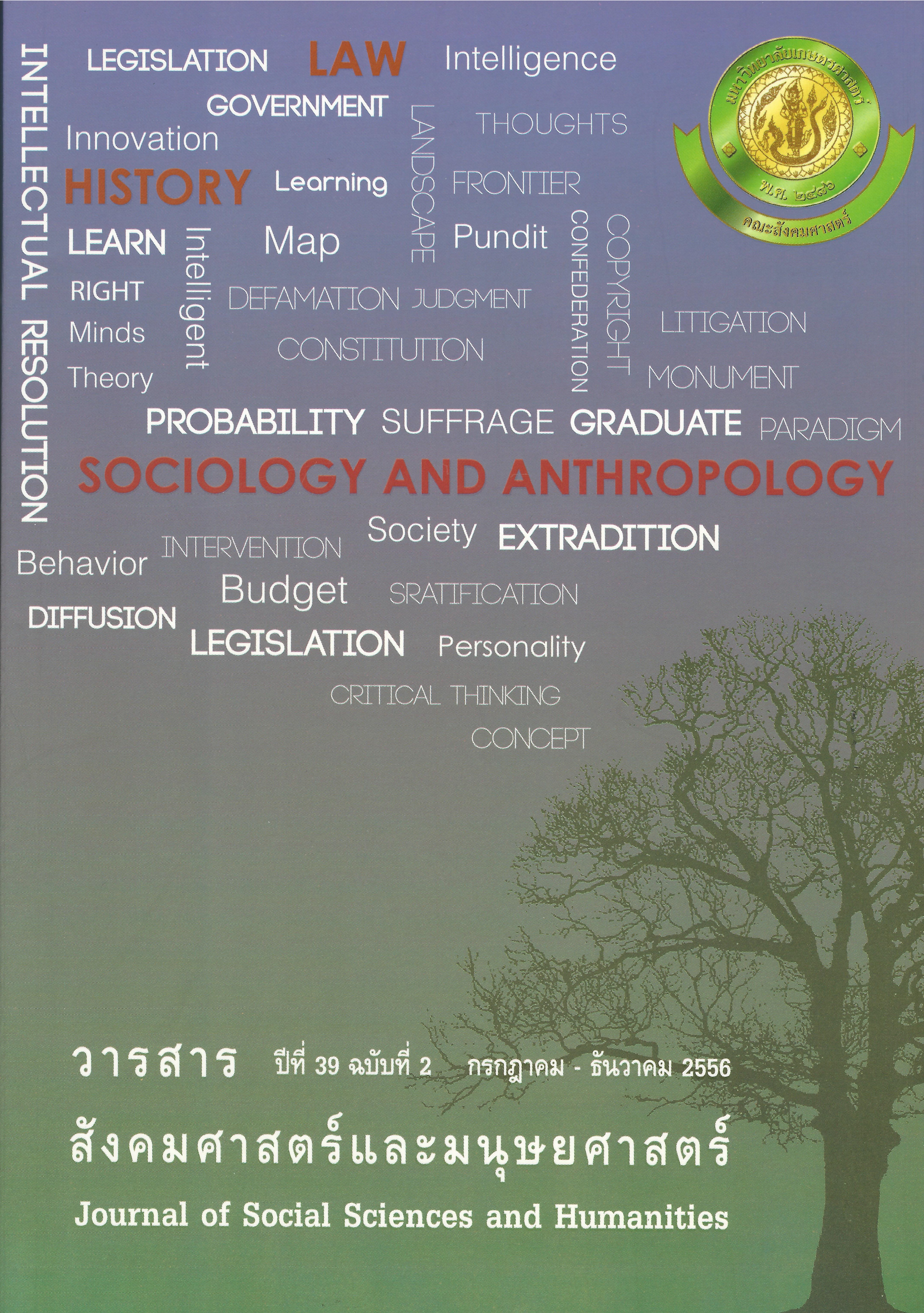การยอมรับตนเอง สัมพันธภาพในครอบครัว การมีส่วนร่วมในชุมชน กับ คุณภาพชีวิตของผู้สูงอายุใน เคหะชุมชนดินแดง กรุงเทพมหานคร
Main Article Content
บทคัดย่อ
การวิจัยครั้งนี้มีวัตถุประสงค์เพื่อศึกษาระดับการยอมรับตนเอง สัมพันธภาพในครอบครัว และการมีส่วนร่วมในชุมชน กับคุณภาพชีวิตของผู้สูงอายุในเคหะชุมชนดินแดง กรุงเทพมหานคร เปรียบเทียบคุณภาพชีวิตของผู้สูงอายุในเคหะชุมชนดินแดงตามปัจจัยส่วนบุคคลที่แตกต่างกัน ตลอดจนศึกษาความสัมพันธ์ระหว่างการยอมรับตนเองกับคุณภาพชีวิต ความสัมพันธ์ระหว่างสัมพันธภาพในครอบครัวกับคุณภาพชีวิต และความสัมพันธ์ระหว่างการมีส่วนร่วมในชุมชนกับคุณภาพชีวิต กลุ่มตัวอย่างเป็นผู้สูงอายุในเคหะชุมชนดินแดง กรุงเทพมหานคร จำนวน 340 คน คัดเลือกโดยวิธีการชักตัวอย่างแบบสุ่มโดยแบ่งชั้นภูมิตามสัดส่วน และวิเคราะห์ข้อมูลโดยใช้โปรแกรมสำเร็จรูปทางสถิติ สถิติที่ใช้ ได้แก่ ค่าร้อยละ ค่าเฉลี่ย ส่วนเบี่ยงเบนมาตรฐาน การทดสอบแบบที การวิเคราะห์ความแปรปรวน การทดสอบรายคู่โดยวิธี LSD และค่าสัมประสิทธ์สหสัมพันธ์ของเพียร์สัน ผลการวิจัยพบว่า การยอมรับตนเองอยู่ในระดับสูง สัมพันธภาพในครอบครัวอยู่ในระดับปานกลาง ส่วนในด้านการสื่อสารอยู่ในระดับสูง การมีส่วนร่วมในชุมชนอยู่ในระดับปานกลาง คุณภาพชีวิตอยู่ในระดับปานกลาง ส่วนในด้านสัมพันธภาพกับสังคม และความเชื่อส่วนบุคคลอยู่ในระดับสูง ในด้านปัจจัยส่วนบุคคลพบว่าผู้สูงอายุที่มีอายุแตกต่างกันมีคุณภาพชีวิตแตกต่างกันที่ระดับนัยสำคัญทางสถิติ 0.01 นอกจากนี้ยังพบว่าการยอมรับตนเองมี ความสัมพันธ์ทางบวกกับคุณภาพชีวิตที่ระดับนัยสำคัญทางสถิติ 0.05 ในขณะที่ สัมพันธภาพในครอบครัวไม่มีความสัมพันธ์กับคุณภาพชีวิต ส่วนด้านการสื่อสารมีความสัมพันธ์ทางบวกกับคุณภาพชีวิตที่ระดับนัยสำคัญทางสถิติ 0.05 แต่การมีส่วนร่วมในชุมชนไม่มีความสัมพันธ์กับคุณภาพชีวิต
Self-Acceptance, Family Relationship, Community Participation and Quality of Life of the Elderly at Dindaeng Housing Community in Bangkok Metropolitan
The objectives of this research were to study the levels of self-acceptance, family relationship, community participation, and quality of life from the elderly at Din Daeng housing community in Bangkok metropolitan; to compare different personal factors; to establish the relationship between self-acceptance and quality of life; to establish the relationship between family relationship and quality of life; and to establish the relationship between community participation and quality of life. The sample were 340 elderlies from Din Daeng Housing Community in Bangkok selected by stratified random sampling. The data were analyzed by a computer package. Statistical methods included the percentages, the arithmetic mean, the standard deviation, the t-test, the analysis of variance, the Least Significant Difference, and Pearson’s product moment correlation coefficient.
The results of this research were as follows. First, self-acceptance, family communication, social relationship and spirituality/religion/personal beliefs were at high levels while family relationship, community participation and quality of life were at the moderate level. Secondly, the elderly with different ages had significantly different quality of life at the 0.01 level. Thirdly, self-acceptance were positively related to quality of life at the 0.05 level of statistical significance. Fourthly, family relationship and communication dimension were also positively related to quality of life at the 0.05 level of statistical significance. However, community participation was not related to quality of life.


